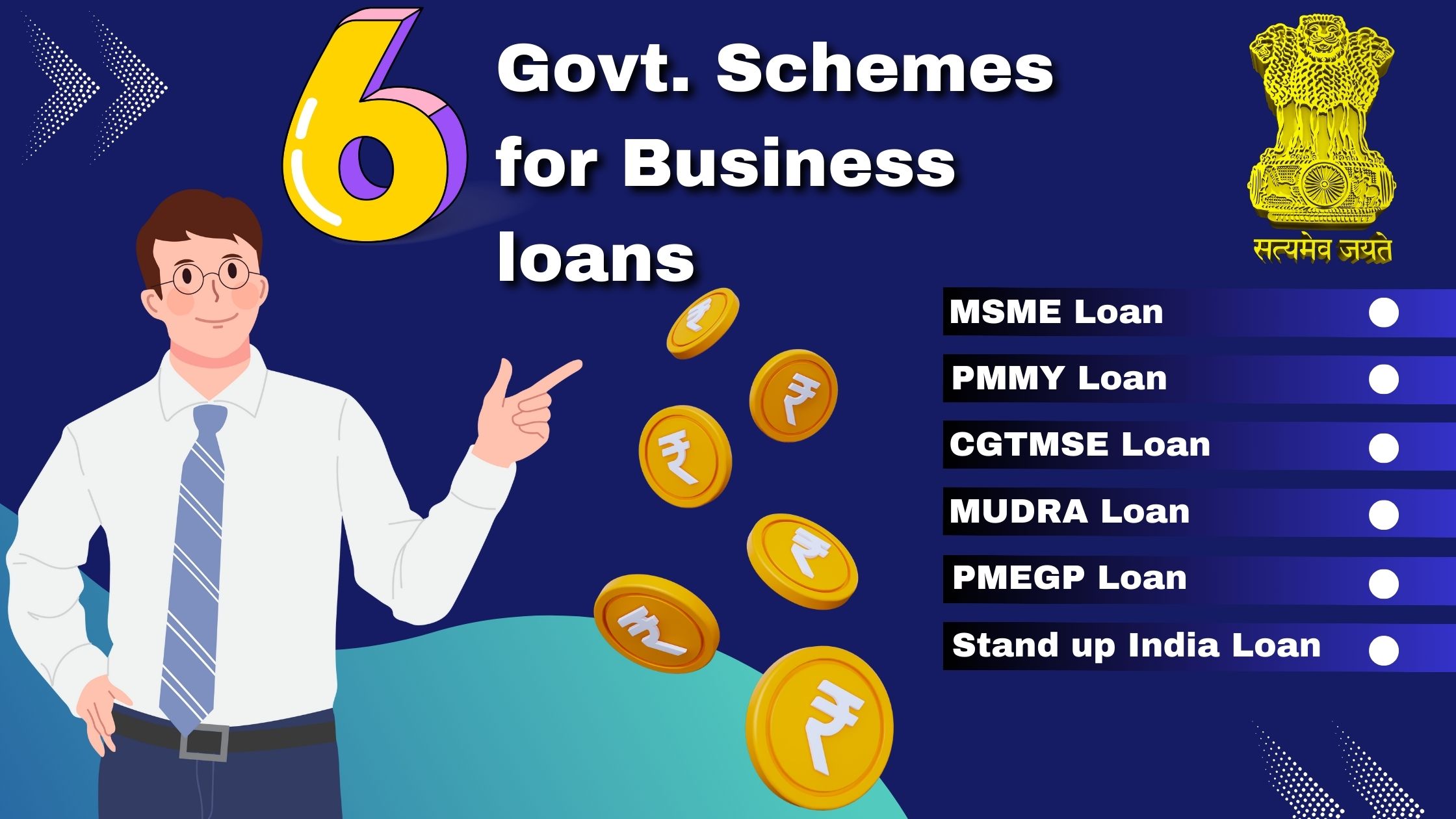In the dynamic landscape of Indian economy, the Government schemes for business loan in India for businesses are instrumental, serving as a lifeline to a diverse array of enterprises, including the 80 lakhs registered micro, small and medium enterprises(MSMEs) that underpin the economic vitality of the nation. These Micro, Small, and Medium Enterprises play a pivotal role in generating employment, fostering innovation, and boosting economic growth. With over 14.80 lakhs registered corporations and MSMEs, these businesses contribute substantially to India’s GDP.
In this content discussion on the top government schemes for business loan, focusing on those tailored to MSMEs, illustrating how these initiatives propel entrepreneurial success and fortify economic prowess of India.
The business loan government scheme introduced by the Indian government has launched a range of strategic initiatives under various government loan schemes for businesses. These schemes encompass government business loans, small business finance, and loan schemes tailored for new businesses.
Aimed at promoting small business financing and providing significant capital for growth, these programs are a testament to the government’s commitment to supporting entrepreneurship in India.
Whether it is an established business or a budding entrepreneur, exploring these business loan government scheme for small businesses can provide the much-needed financial boost to fuel the business aspirations and contribute to the economic progress of the nation.
Government recognition to startups and their importance:
The government recognises the importance of startups in driving innovation and economic growth. Various ministries and departments have introduced schemes to provide financial, infrastructural, and regulatory support to startups. The listed business loan government schemes cover sectors like technology, manufacturing, agriculture, healthcare, and more.
The details of each scheme include objectives, eligibility criteria, application process, and benefits, are provided. Please note that the information may change, so it’s advisable to refer to the official websites for the latest updates.
The Central Government Schemes section serves as a valuable resource for entrepreneurs to explore government support measures. Leverage these schemes to propel the startup towards success and contribute to the vibrant startup ecosystem in India. Here are some of the leading business loan government schemes designed to support and sustain the business operations.
Government Schemes for Business Loan for micro, small and medium enterprises:
The Micro, Small and Medium Enterprises (MSMEs) need funding to establish and grow. The Government of India has taken many steps and launched many business loan government schemes to provide credit to MSMEs.
MSMEs contribute significantly to our country for building a strong economy. One of the key aspects of MSMEs is access to credit. MSMEs require credit or funding to establish the business or the expansion of the business.
To provide credit facilities for the MSMEs, the Government of India has come up with many business loan government schemes, and even the banking sector and financial institutions grant loans to them. Some of the well-recognised MSME loan schemes of 2023, popular due to the business getting disrupted due to COVID-19, are discussed below.
1.Pradhan Mantri Mudra Yojana (PMMY)
The Hon’ble Prime Minister launched the Pradhan Mantri Mudra Yojana (PMMY) scheme on 8th April 2015. This business loan government scheme provides loans up to 10 lakhs to non-corporate and non-farm small or micro-enterprises. These loans are classified as MUDRA (Micro Units Development and Refinance Agency Limited) loans under PMMY.
MUDRA is a non-banking financial company (NBFC) which supports the development of MSMEs. MUDRA provides support by refinancing to banks, microfinance institutions (MFIs) and NBFC for lending loans to micro units having a loan requirement of up to 10 lakhs.
Under this scheme, the loans are provided by Commercial Banks, Small Finance Banks, MFIs and NBFCs. The borrowers can approach any of these lending institutions or apply for loans online through the Udyami Mitra portal.
Under this business loan government scheme of PMMY, there are three different schemes namely ‘Shishu’, ‘Kishore’ and ‘Tarun’ which signify the stage of development or growth and the funding need of the beneficiary micro-units or entrepreneurs and it also provides a reference point for the next phase of graduation or growth.
Nature of Assistance – ‘Shishu’ offers loans up to Rs.50,000. ‘Kishor’ provides loans above Rs.50,000 up to Rs.5 lakhs. ‘Tarun’ provides loans above Rs.5 lakhs up to Rs. 10 lakhs to micro-units.
2.Prime Minister’s Employment Generation Programme (PMEGP)
The Prime Minister’s Employment Generation Programme (PMEGP) is a merger of two schemes of Prime Minister’s Rojgar Yojna (PMRY) and Rural Employment Generation Programme (REGP).
This business loan government scheme focuses on generating self-employment opportunities to the unemployed youth and traditional artisans through micro-enterprise establishments in the non-farm sector.
It is executed by the Khadi and Village Industries Commission (KVIC) which functions as the nodal agency for this scheme at the national level.
At the state level, this business loan government scheme is implemented through the State KVIC Directorates, District Industries Centres (DICs), State Khadi and Village Industries Boards (KVIBs), and banks.
Under this scheme, the KVIC routes government subsidy through designated banks for eventual disbursal to the entrepreneurs or beneficiaries directly into their bank accounts.
Eligibility: Any individual/s who is/are above 18 years of age is/are eligible. The individual/s should be at least VIII standard pass for the projects, in the manufacturing sector which cost above Rs.10 lakh and in the business or service sector which cost above Rs. 5 lakhs.
Under this business loan government scheme, only the new projects are considered for sanction. Self Help Groups, Institutions registered under Societies Registration Act, 1860, Production-based Co-operative Societies, and Charitable Trusts are also eligible.
Any unit/s existing under PMRY, REGP or any other scheme of Government of India or State Government are not eligible. Even the units that have already availed Government Subsidy under any other scheme of Government of India or State Government are not eligible.
Parameter: The maximum cost of the project or unit admissible in the manufacturing sector is Rs.25 lakhs and in the business or service sector is Rs.10 lakhs for assistance under this scheme.
The beneficiary’s rate of the subsidiary for the general category is 15% in urban areas and 25% in rural areas. The beneficiary’s rate of the subsidiary for the special category is 25% in urban areas and 35% in rural areas.

3.Credit Guarantee Trust Fund for Micro & Small Enterprises (CGTMSE)
Ministry of Micro, Small and Medium Enterprises and Small Industries Development Bank of India (SIDBI) together established the Credit Guarantee Fund Trust for Micro and Small Enterprises (CGTMSE). CGTMSE is established in order to implement a credit guarantee scheme for MSMEs.
The Government of India and SIDBI contribute to the corpus of this business loan government scheme. The whole idea behind this trust is providing financial assistance to the small and medium industries without any third-party guarantee or collateral.
The guarantee coverage under this scheme ranges from 85% for Micro Enterprise (up to Rs 5 lakh), 75% for others and 50% for retail activity.
Eligibility: Both existing and new enterprises are eligible under this business loan government scheme. The candidates meeting the eligibility criteria may approach banks or financial institutions and select Regional Rural Banks which are eligible for getting assistance under this scheme.
Objective of the scheme: The guarantee cover available under the scheme is to the extent of 50%/75%/ 80% or 85% of the sanctioned amount of the credit facility. For micro-enterprises up to 5 lakhs, the extent of guarantee cover is 85%.
The extent of guarantee cover is 50% of the sanctioned amount of the credit facility for credit from 10 lakhs to 1 crore per MSME borrower for retail trade activity. In case of default, the trust settles the claim up to 75% of the amount in default of the credit facility, which is extended by the lending institution for credit facilities up to 2 crores.
4.Credit Linked Capital Subsidy Scheme (CLCSS)
The Credit Linked Capital Subsidy Scheme (CLCSS) renders a subsidy for technology upgradation to the MSMEs. This business loan government scheme provides 15% subsidy for additional investment up to Rs.1 crore for technology upgradation by MSMEs. Technology upgradation means induction of state-of-the-art or near state-of-the-art technology.
The candidates meeting the eligibility criteria may approach 9 nodal banks or agencies to avail the subsidy under this business loan government scheme. These 12 nodal banks or agencies are SIDBI, NABARD, SBI, Bank of Baroda, PNB, BOI, Canara Bank and Indian Bank.
Eligibility: Any MSME unit is eligible under this scheme. But the units replacing existing equipment or technology with the same equipment or technology will not qualify for a subsidy under this scheme. Similarly, the units upgrading with used machinery would not be eligible under this scheme.
Objective: This scheme aims at facilitating technology upgradation by providing 15% upfront capital subsidy to MSMEs on institutional finance availed by them. This subsidy is provided to MSMEs for induction of well-established and improved technologies in specified sub-sectors or products approved under the scheme.
This scheme provides an upfront subsidy of 15% on institutional credit up to Rs.1 crore (i.e. a subsidy cap of Rs.15 lakh) for identified sectors/subsectors/ technologies.
5.Equity Infusion for MSMEs through Fund of Funds
MSMEs face a severe shortage of equity. Venture Capital (VC) or Private Equity (PE) firms offer early-stage funding, but very few of them provide growth-stage funding. To encourage MSMEs to grow and get listed on stock exchanges, the Fund of Funds provides equity funding for MSMEs who have growth potential and viability.
This business loan government scheme will be able to intermediate different types of funds into underserved MSMEs and address the growing needs of viable and high growth MSMEs with the intervention of the government.
Eligibility: All MSMEs are eligible. MSMEs can apply through Investor Funds onboarded and registered with the proposed Fund of Funds.
Objective: The Government of India will support VC or PE firms in investing in commercially viable MSMEs for meeting their growth requirements. The proposed fund of funds will encourage private sector investments in the MSME with leverage of Rs.50,000 crore.
6. Credit Guarantee Scheme for Subordinate Debt (CGSSD)
Credit Guarantee Scheme for Subordinate Debt (CGSSD) seeks to extend support to the promoters of the operational MSMEs which are stressed and have become NPA as on 30th April 2020. The promoters, in turn, will infuse this amount in the MSME unit as equity and thereby increase the liquidity and maintain the debt-equity ratio.
Subordinate debt will be of considerable help to sustain and revive the MSMEs which have become NPA or are on the brink to become NPA. The promoters of the MSMEs will be given credit equal to 15% of their stake (equity plus debt) or Rs.75 lakh whichever is lower.
Eligibility: The operational MSMEs which are NPA or are stressed will be eligible. The promoters of MSME who meet the eligibility criteria can apply for this scheme. They can approach scheduled commercial banks to avail benefit under the business loan government scheme.
Objective: The scheme provides 90% guarantee for the sub-debt, and the remaining 10% will be from the concerned promoters. The maximum tenure for repayment is ten years. There is a moratorium of 7 years on payment of the principal.
7. SIDBI Make In India Loan For Enterprises (SMILE)
The SIDBI Make In India Loan For Enterprises (SMILE) is intended to take forward the Government of India’s ‘Make in India’ campaign and help MSMEs take part in this campaign.
This business loan government scheme provides a soft loan in the nature of quasi-equity. It also provides term loans on relatively soft terms to MSMEs to meet the required debt-equity ratio for their establishment.
It also provides business loan government schemes to the existing MSMEs to pursue opportunities for their growth.
Eligibility: New enterprises in the manufacturing and the services sector is covered under this business loan government scheme. The existing enterprises undertaking expansion for taking advantage of the new emerging opportunities are eligible under this scheme.
This scheme will also cover the existing enterprises undertaking expansion for undertaking modernisation, technology upgradation or other projects for growing their business. Under this business loan government scheme, the emphasis is given to financing smaller enterprises within MSME.
Objective: The minimum loan size is Rs.10 lakh for equipment and finance. The minimum loan size for others is Rs.25 lakh. The repayment period is up to 10 years, including moratorium of up to 36 months.
8. MSME 59 minutes Business Loan Government Schemes for Startups
The Government of India recently announced to offer MSME Business Loan for Startups in 59 Minutes. A new web portal was launched to provide loans to MSMEs in 59 Minutes. The processing of the loans for MSMEs on this online portal is fully automated. This portal will process the loans within one hour. After the loan is approved through this portal, the loan is disbursed to the applicant of the loan in the next seven or eight working days.
This business loan government scheme aims at automation and digitisation of various processes of business loans offered, which includes the term loans, working capital loans and mudra loans.
Eligibility: Any existing business or MSMEs which wants to apply for a business loan (term loan/ working capital loan) in-principal approval is eligible. The business should be IT compliant and must have a six months Bank Statement Facility.
Both GST registered as well as not-registered businesses are eligible. If any business not registered with GST or has not filed ITR or does not have a bank statement applies for mudra loan, then the business can provide the related details by self-declaring the same.
The income or revenue, repayment capacity, existing credit facility and any other factors as set by lenders determine the eligibility criteria of the borrowers. The portal is integrated with CGTMSE to check eligibility of borrowers.
Objective: The business loan in-principal approvals are provided from Rs.1 lakh to Rs.5 crores. The loans are provided with or without collateral. The rate of interest starts from 8.5% onwards. The mudra loan in-principal approvals are provided from Rs.10,000 to Rs.10 lakh.
9.MSME Business Loan Government Scheme by Banks
Banks and other lending institutions offer term loans and working capital loans to MSMEs. The working capital loans are offered to MSMEs by banks to fulfil their daily cash requirements. The term loans are offered to MSMEs for capital expansion, capital expenditure or buying fixed assets.
Apart from term loans and working capital loans, the banks or financial institutions have different business loan government schemes which they offer to MSMEs. The MSME loan schemes offered by different banks or financial institutions have different terms and conditions applicable.
Each business loan government scheme offered by the banks/financial institutions has different interest rates. The interest rates are based on various factors such as desired loan amount, repayment tenure, nature and tenure of business, creditworthiness and repayment capability.
Many MSME loans are offered without collateral by banks. Some of the banks which offer different loans schemes are State Bank of India, HDFC Bank, ICICI Bank, Axis Bank etc. NBFCs, Small Finance Banks (SFBs), Regional Rural Banks (RRBs) and Micro Finance Institutions are some of the financial institutions that offer loans to MSMEs.
10. Stand-up India scheme loans
Eligible persons: If the applicant for business loan without collateral is a woman entrepreneur or belong to a Scheduled Caste Scheduled Tribe, then one may be eligible for Stand-Up India loans.
Purpose or Aim: These loans are to be used for setting up greenfield enterprises in manufacturing, services, trading, or agriculture allied activities and sectors.
Loan Amount: The loan amount available is between Rs 10 lakh and Rs 1 crore. Composite loan of 85% of the project cost inclusive of term loan and working capital loan.
Rate of Interest and tenure: The interest rate is calculated on base rate that is MCLR plus 3% plus tenor premium, with a maximum moratorium period of 18 months. The repayment tenure of 7 years is allowed.
Security: Beside primary security, the loan may be secured by collateral security or guarantee of Credit Guarantee Fund Scheme for Stand-Up India Loans (CGFSIL) as decided by the lender bank.
11. Agriculture Infrastructure Fund scheme
The role of infrastructure is crucial for agriculture development and for taking the production dynamics to the next level. It is only through the development of infrastructure, especially at the post-harvest stage that the produce can be optimally utilized with opportunity for value addition and fair deal for the farmers.
The Scheme: The Union Cabinet in July 2020 has approved a new pan India Central Sector Scheme called Agriculture Infrastructure Fund (National Agriculture Infra Financing Facility).
The business loan government scheme shall provide a medium-long term debt financing facility for investment in viable projects for post-harvest management Infrastructure and community farming assets through interest subvention and financial support.
Financing facility of Rs. 1,00,000 crores will be provided for funding Agriculture Infrastructure Projects at farm-gate & aggregation points such as Primary Agricultural Cooperative Societies (PACS), Farmers Producer Organizations (FPOs), Agriculture entrepreneurs, Start-ups, Self Help Groups (SHGs) etc.
Impetus for development of farm gate & aggregation point, affordable and financially viable Post Harvest Management infrastructure.
Duration: The Scheme will be operational from 2020-21 to 2032-33. Loan disbursement under the scheme will complete in six years.
Purpose: Accordingly ,Department of Agriculture and Farmers’ Welfare (DA&FW) has formulated the Central Sector Scheme to mobilize a medium – long term debt financing facility for investment in viable projects relating to postharvest management Infrastructure and community farming assets through incentives and financial support.
Coverage under the Scheme: Credit guarantee coverage will be available for eligible borrowers from this financing facility of business loan government scheme under Credit Guarantee Fund Trust for Micro and Small Enterprises (CGTMSE) scheme for loans up to ₹ 2 crore.
The fee for this coverage will be paid by the Government. In case of FPOs the credit guarantee may be availed from the facility created under FPO promotion scheme of DA&FW.
Benefits of the Scheme: All loans under this financing facility of business loan government scheme will have interest subvention of 3% per annum up to a limit of ₹ 2 crore. This subvention will be available for a maximum period of 7 years.
In case of loans beyond ₹ 2 crore, then interest subvention will be limited up to ₹ 2 crore. The extent and percentage of funding to private entrepreneurs out of the total financing facility may be fixed by the National Monitoring Committee.
Eligibility: 1) Participating lending institutions will decide criteria for selection of eligible borrower as per their own policy, keeping in mind the viability of the projects.
2) 24% of total grants – in – aid under the scheme should be utilized for SC/ST entrepreneurs (16% for SC and 8% for ST). Besides this, lending institutions would ensure adequate coverage of entrepreneurs belonging to women and other weaker segments of society may be provided loan on priority basis.
3) PSUs are directly not eligible under the scheme, but projects sponsored by them under PPP (Public Private Partnership) are eligible.
Main features of Agriculture Infrastructure Fund Scheme under National Agriculture Infra Financing Facility:
- Convergence with all schemes of central or state government.
- Online single window facility in collaboration with participating lending institutions.
- Project Management Unit to provide handholding support for projects including project preparation.
- Size of the financing facility – ₹ 1 lakh Crore.
- Credit Guarantee for loans up to ₹ 2 Crore.
- Interest subvention of 3% p.a., limited to ₹ 2 crore per project in one location, though loan amount can be higher.
- Cap on lending rate, so that benefit of interest subsidy reaches the beneficiary and services to farmers remain affordable.
- Multiple lending institutions including Commercial Banks, Cooperative Banks, RRBs, Small Finance Banks, NCDC, NBFCs etc.
- One eligible entity puts up projects in different locations then all such projects will be eligible under the scheme for loan up to ₹ 2 crore.
- For a private sector entity, such as farmer, agri entrepreneur, start-up there will be a limit of maximum of 25 such projects.
- Limitation of 25 projects will not be applicable to state agencies, national and state federations of cooperatives, federations of FPOs and federation of SHGs.
12. Pradhan Mantri Formalisation of Micro Food Processing Enterprises Scheme:
As part of Atmanirbhar Bharat Abhiyan, Ministry of Food Processing Industries (MoFPI) is implementing a centrally sponsored “Pradhan Mantri Formalisation of Micro Food Processing Enterprises (PMFME) Scheme” for providing financial, technical and business support for setting up or upgradation of micro food processing enterprises in the country.
This business loan government scheme is operational for a period of five years from 2020-21 to 2024-25 with an outlay of Rs. 10,000 Crore for supporting 2 lakh micro food processing enterprises.
Aim of the Scheme: The aim of this business loan government scheme is to promote the local products in the food processing sector, the PMFME Scheme primarily adopts One District One Product (ODOP) approach to reap the benefit of scale in terms of procurement of inputs, availing common services and marketing of products.
It provides the framework for value chain development and alignment of support infrastructure. Further, under Branding and Marketing component of the Scheme, support is provided to FPOs (Farmer Producer Organizations) or Self-Help Groups (SHGs) or Cooperatives or Special Purpose Vehicle (SPV) of ODOP based micro food processing enterprises for Market Study and Product Standardization, Packaging Material, Quality Control and food safety adherence for consumer retail sales, Warehousing and Storage Rentals, Marketing and Promotion.
Objectives: The objectives of this business loan government scheme are to build the capability of microenterprises to enable:
Benefits: The program under business loan government scheme has four broad components addressing the needs of the sector:
- Support to individuals and groups of micro-enterprises.
- Branding and Marketing support.
- Support for strengthening of institutions.
- Setting up a robust project management framework.
The Eligible Borrowers for PMFMPE can be: Under this business loan government scheme the entities who are eligible to avail the loan are:
- Farmer Producer Organization (FPO)
- Self-Help Groups (SHGs)
- Co-operatives
- Existing Micro Food Processing Entrepreneurs
- New Units, whether for individuals or groups would only be supported for One District One Product (ODOP)
Conclusion:
The government of India has shown unwavering commitment to fostering small businesses through initiatives like small business loan government scheme and various government loan schemes for new and existing enterprises has been instrumental. These schemes, aimed at promoting small business finance, have provided a vital lifeline for entrepreneurs, helping them overcome financial barriers and drive economic growth.
Read more:
- How to get Business Loan without collateral security?
- How to get Term Loan for business?
- How to apply for Cash Credit loan from bank?







